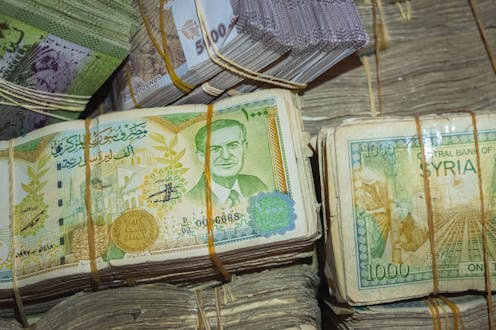Will multinational companies flock to Syria? Maybe, if foreign aid arrives first
- Written by Ana Carolina Garriga, Professor of Political Science, University of Essex

Syria’s new foreign minister, Asaad al-Shaibani, recently appeared[1] at the World Economic Forum’s annual conference in the Swiss resort of Davos. He announced that his country is open for business and seeking foreign investment.
After more than 13 years of civil war and decades of dictatorship that saw Syria become a pariah state, the country needs all the financial support it can get. But will foreign firms set up shop in Syria?
Countries like Syria, emerging from conflict, face the challenge of convincing investors they are a safe environment for investment. Our research[2] suggests companies look at what governments are doing in terms of aid when considering whether to invest. In general, post-war countries that receive more foreign aid subsequently receive more foreign investment.
Foreign direct investment (FDI) typically involves multinational companies building factories, opening stores or investing capital in businesses abroad. It can be highly beneficial for developing countries.
FDI is the most stable source[3] of international financing, and generally has positive long-term effects on economic[4] growth[5] and poverty reduction. More importantly for incumbent governments, FDI has positive short-term effects on domestic employment[6], government financing and spending[7], and foreign exchange reserves.
It also has a potential positive effect[8] on government approval ratings, as attracting inward FDI signifies political[9] competence[10] to voters. These reasons are why almost all governments compete to receive these financial flows.
FDI is especially important in post-conflict countries. Civil wars typically destroy or seriously harm the productive capacity[11] of countries. In Syria, the conflict destroyed tens of billions of US dollars worth of infrastructure, and incapacitated more than half[12] its electrical grid.
War often disrupts a country’s access to the international economic exchanges that help economic growth[14]. Since the beginning of its conflict in March 2011, Syria’s annual exports have dropped[15] from US$8.8 billion (£7.1 billion) to US$1 billion, due to the war and war-related sanctions. Its economy has shrunk by 54%.
Foreign investment can contribute substantially to rebuilding the economy[16]. But post-conflict countries might seem risky to investors.
Foreign firms sometimes avoid countries plagued by violence[17], political[18] instability[19], or political[20] risk[21]. Conflict could reemerge in Syria, and multinational corporations probably do not want their business in a place where factories could be bombed or customers killed.
Post-conflict situations are also relatively information-poor[22] environments. Conflict often hampers data collection efforts, and governments, in desperate need of capital, may be incentivised to misrepresent the actual state of the economy[23] or strength of the political system.
In the case of Syria, foreign observers do not know what to make of the new ruling coalition, which is led by a designated terrorist organisation in Hayat Tahrir al-Sham. While the international community seems to want to support Syria – the UK, for example, has been clear[24] about its intention to help the country – observers are unsure about the environment and how it might change in the coming years.
In these kinds of situation, international investors look at a variety[25] of signals[26]. In our research, we show that one key signal is whether other governments have sent official development aid to post-conflict countries.
We argue that the decision to send aid to a country signals the donors’ trust of local authorities. What matters is this presence of aid, whether or not the aid achieves its intended purpose.
Examining decades of global data, we have found a robust relationship[27] between foreign aid and subsequent investment in post-conflict countries – with one striking exception.
There does not seem to be a relationship between aid from the US and foreign investment. Because so much of US foreign aid is geostrategic – to shore up alliances or secure access to particular areas – investors do not seem to view it as a valuable signal about the recipient country.
So, Syria should perhaps not worry too much about the new US president Donald Trump’s plan to cut[28] American foreign aid. If aid from other government donors can still flow in, this could encourage investment to follow.
Fortunately for Syria, some countries and international organisations have already pledged aid – including the UK, which has announced £50 million[30] in humanitarian aid for the country and its refugees. This seems like a good sign for Syria’s future – even more so because of the signal it sends to foreign investors.
Specific domestic policies that encourage FDI and build stronger institutions will be necessary to secure investment in the longer term. Syria will need to demonstrate its commitment to the rule of law and property rights, while creating a stable environment for investment.
However, if the pledged aid materialises – and if more countries chip in – this could lead to substantial economic benefits for Syria.
References
- ^ recently appeared (www.reuters.com)
- ^ Our research (doi.org)
- ^ most stable source (www.imf.org)
- ^ economic (onlinelibrary.wiley.com)
- ^ growth (onlinelibrary.wiley.com)
- ^ domestic employment (www.tandfonline.com)
- ^ spending (www.tandfonline.com)
- ^ potential positive effect (www.journals.uchicago.edu)
- ^ political (doi.org)
- ^ competence (www.cambridge.org)
- ^ productive capacity (academic.oup.com)
- ^ more than half (carnegieendowment.org)
- ^ Vagabjorn / Shutterstock (www.shutterstock.com)
- ^ economic growth (journals.sagepub.com)
- ^ dropped (www.reuters.com)
- ^ rebuilding the economy (academic.oup.com)
- ^ violence (www.emerald.com)
- ^ political (academic.oup.com)
- ^ instability (onlinelibrary.wiley.com)
- ^ political (journals.sagepub.com)
- ^ risk (www.tandfonline.com)
- ^ relatively information-poor (journals.sagepub.com)
- ^ actual state of the economy (link.springer.com)
- ^ has been clear (www.gov.uk)
- ^ look at a variety (academic.oup.com)
- ^ signals (link.springer.com)
- ^ robust relationship (doi.org)
- ^ plan to cut (www.bbc.co.uk)
- ^ Giuseppe Lami / EPA (epaimages.com)
- ^ £50 million (www.gov.uk)







